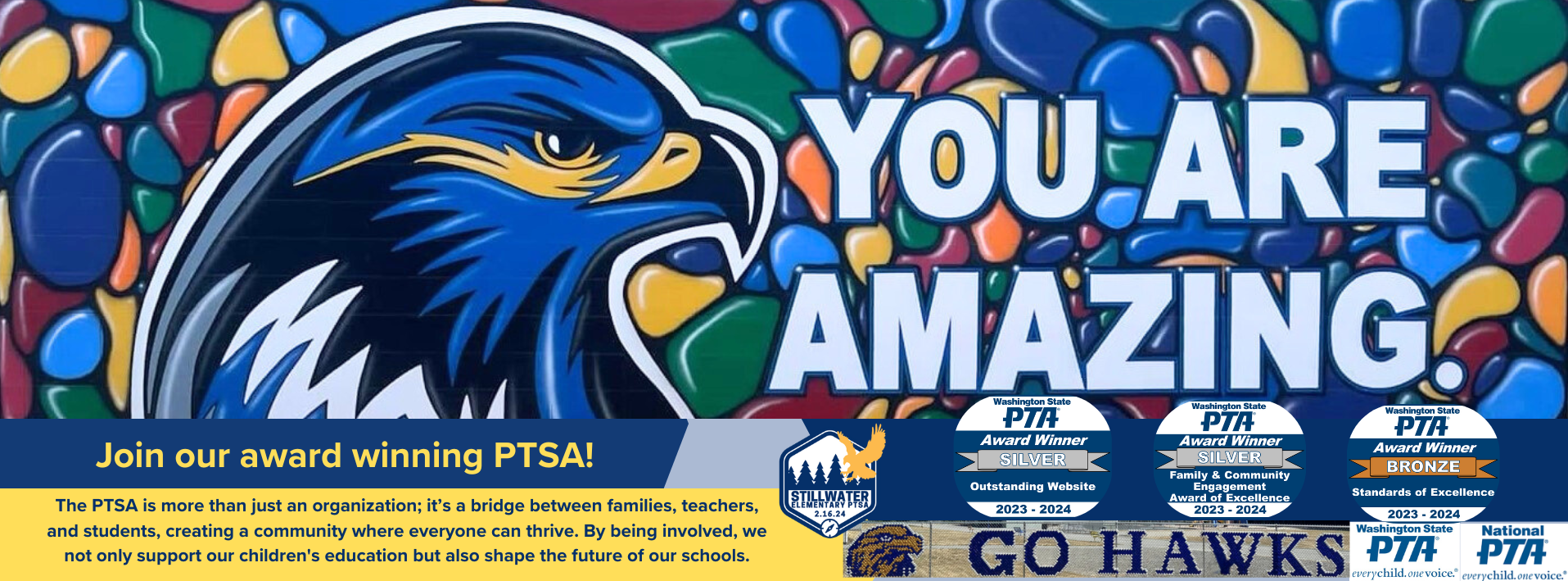2017-2018 Legislative Session Update
Here’s updates on the 2018 WSPTA legislative priorities:
• Social and Emotional Learning–HB1377 passed the Legislature this year, and was signed by Governor Inslee on March 22, 2018 (http://lawfilesext.leg.wa.gov/biennium/2017-18/Pdf/Bills/Session%20Laws/House/1377-S2.SL.pdf#page=1). The bill defines certain school employee positions, such as social workers and psychologists, and directs districts with more than 2,000 students to set aside at least six hours of collaboration time during the school year between school counselors, social workers and psychologists. Last session funding was provided to continue the work of the SEL benchmarks group.
• Amply Funding Basic Education—ESSB 6362 passed the House and Senate on party-line votes: 50-47 in the House and 25-23 in the Senate (See the article on Article IX Litigation above).
• Closing the Opportunity Gap—Nothing new.
• Standards for Paraeducators—SB 6388 was signed into law in March by Governor Inslee. This law provides for minimum employment qualifications for paraeducators and $250,000 for training modules, which is included in the 2018 supplemental operating budget (http://lawfilesext.leg.wa.gov/biennium/2017-18/Pdf/Bills/Session%20Laws/Senate/6388-S.SL.pdf#page=1 ).
• Breakfast after the Bell—Governor Jay Inslee signed 2ESHB 1508 into law in March. It mandates breakfast in schools after the start of the school day for high needs schools, and encourages other schools to do the same. The 2018 supplemental operating budget included $1.2 million to implement the bill. This was about half of what had been requested.
Here’s an update of the bills that relate to WSPTA’s “Also Supported Positions” and resolution adopted at the WSPTA Legislative Assembly:
• Dual Credit, Equity & Support–SB 5917 passed the Legislature and was signed into law in March. While the bill only directs Washington’s institutions of higher education to adopt policies regarding granting credit for International Baccalaureate and Cambridge exams, it requires the policies to be posted clearly by fall of 2018. In addition, institutions of higher education must report back to the Legislature by 2020 on the credits they are granting.
• Dyslexia–E2SSB 6162 was signed into law in March, and will require school districts to provide interventions and screening for dyslexia for students in grades K-2, starting in the 2021-22 school year. It includes a work group to review best practices and possible screening tools.
• Post-secondary/Higher Education Access & Affordability– The 2018 supplemental operating budget includes $18.5 million to expand the State Need Grant.
• School meals–SHB 2610 was signed into law, and will require districts to take specific actions to ensure students who qualify for free or reduced-price meals have access to meals at school, along with more specific actions to notify parents or guardians about the eligibility. The bill also prohibits schools and districts from taking action directed at a student under the age of 15 to collect unpaid school meal fees, and from stigmatizing a student who cannot pay for a school meal. Among the requirements, schools and districts, at least monthly, are required to directly certify students for free school meals if the students qualify because of enrollment in assistance programs.
There were a number of WSPTA “Also Supported Issues” that did not receive traction this year:
• Assessments–No action was taken to delink assessments from graduation requirements this session. Also, because a savings was projected from the assessment changes in HB 2224 of 2017, OSPI is directed to report on the savings included in the 2017-19 operating budget and, if the savings haven’t been reached, to report on how they can be achieved.
• Family & Community Engagement–ESHB 1618 failed to make the March 2 cutoff. Legislators said it was a good bill but the momentum this year was on mental health professionals.
• Foster Youth–SSB 6223 failed to make the March 2 deadline.
• Post-secondary/Higher Education Access & Affordability–HB 1512 passed to Senate Ways & Means but failed to make the Feb. 27 cutoff.
• School Construction–SB6531 would have phased in increases for the student space allocation and the actual construction cost over six years, starting in the 2019-21 biennium. The bill didn’t make it past the House Capital Budget Committee. However, a Joint Legislative Task Force on School Construction was created in the 2017-19 capital budget. House members have been named: the appointments include Democratic Reps. Marcus Riccelli and Monica Stonier, and Republican Reps. Vicky Kraft and Mike Steele.
• Teacher Shortage–4SHB 1827 ended up being too complex and too big to pass in a short session. However, the ideas in the bill provide a good launching pad for a bill next session.
There were a number of other legislative session actions of interest to WSPTA members, including:
• 2018 capital budget–The legislature adopted ESSB 6095 for a supplemental budget. While a second round of K-3 classroom grants was not included, additional funding was provided for about nine school districts that had costs increase due to the delay in adoption of the 2017-19 capital budget.
• Civics education–2SHB 1896 will require districts with high schools, starting in the 2020-21 school year, to offer a mandatory, stand-alone half credit in civics education to every student. The exception would be where civics can be embedded in courses that offer the opportunity for both high school and postsecondary credit. This is starting to raise some issues regarding how it would be incorporated into the 24-credit diploma, and how districts would fund curriculum changes to create the new stand-alone course.
• Property tax reduction–SB 6614 enjoyed various iterations over the course of the session but ended up with a one-time decrease of $0.30/$1000 Assessed Value for CY 2019 collections.
